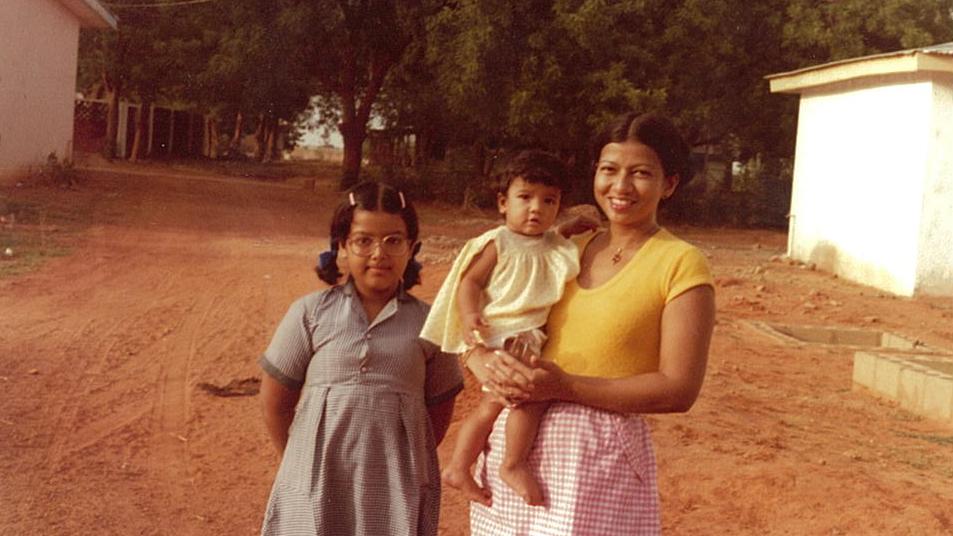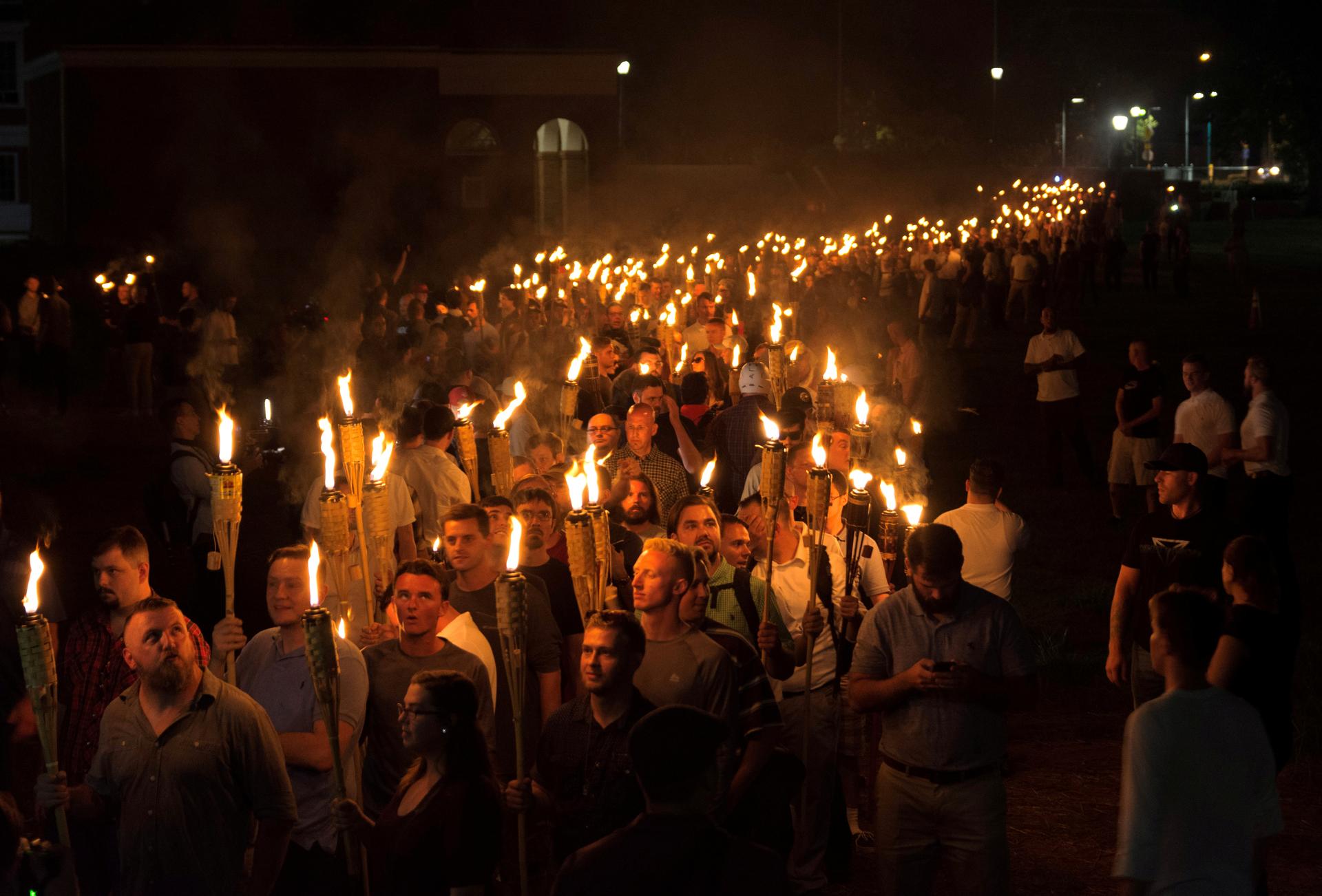White nationalists carry torches on the grounds of the University of Virginia, on the eve of a planned Unite The Right rally in Charlottesville, Virginia, on Aug. 11, 2017.
A few weeks after the catastrophic events in Charlottesville, Virginia, I felt a desperate need to connect with others who were similarly grappling with what it means to be American at this particular moment.
Like many of my generation, rightly or not, I get most of my news from Facebook. Scrolling through my feed, I saw a great deal of sadness, confusion and vitriol. As a South Asian immigrant to this country, I have always been aware of racism, but the spectacle of white supremacists marching in the streets, then mowing down a white woman made it clear — I had been naive to the exact degree to which this racism had been given new life by the election of President Donald Trump.
It felt like a watershed moment. It felt like a moment in which Americans were being asked to take a stand. Would they ally themselves with white supremacy or stand in solidarity with black people, Muslims and immigrants?
Through my Facebook feed, I realized that many white people, even those who think of themselves as allies do not really, viscerally understand what it means to live inside a body marked as a threat.
So, I decided to open up my Facebook page to people of color willing to share stories about what it means to be vulnerable in this particular way. I asked white people to listen.
Immediately after posting, I wondered if I was asking for too much. Was it presumptive to ask people of color to reveal vulnerabilities on this public thread? Was it presumptive to ask white people to simply witness and not speak up? I wondered if I should just delete the thread. After all, nothing of consequence ever gets worked out on Facebook.
Then, the responses started rolling in. For the next 24 hours, they arrived within minutes and even seconds of each other. People shared stories of racial profiling, of police abuse, of being followed in stores, immigrants talked about being told to "go home," being told they spoke English well even though it was their only mother tongue.
Within a day there were 215 reactions, Facebook’s emoji-like responses, and 245 written comments. My question and the responses it sparked provided a tiny glimpse into how race shapes people of color’s experience in this country on a daily basis.
A dear friend of mine, Candi M., is an immigrant of Latin and South Asian heritage and someone I have known for a decade. She wrote, “I worked hard to purchase my first car on my 16th birthday, which I was deeply proud to drive to school the next day. At the end of the school day … someone had spray-painted the N-word across the windshield and removed all the tires off of my car …”
I had known this friend for 10 years. We were once roommates. But she had never shared this story with me, even though it was clearly a moment of deep trauma and pain. After she posted this comment, she texted to say that she had almost deleted it many times while writing it. Even though the incident had happened years before, some part of it still felt shameful to her.
I was born in Sri Lanka and I grew up in Nigeria. At the age of 12 in 1984, I immigrated to the US with my family. We have been citizens since 1986 and have tried desperately hard to fulfill our American immigrant dream. For the most part, we have been incredibly lucky and successful in this country and have created full, thriving lives, which might have been impossible in the country where our parents were born. We are privileged to be educated, English-speaking immigrants and yet, we are always aware that the color of our skins affects our daily existence.
I have been told to "go home” more times than I can remember. I have had people refuse to speak to me and only address my white husband. Once, a man pushed his way between myself and a black friend and proclaimed himself “the cream in the Oreo.” I have been one of the first non-white professors in a writing program and had to deal with that particular fall-out. I have dozens more stories like these.

In my Facebook post, I specifically asked white people to listen. I did so because white privilege is almost always invisible to white people. Coming to terms with your own unconscious invisible privilege is a difficult thing to do; it means actively exploring the ways you gain from a system built for your benefit. The point of my post was both to provide space for people of color share their stories and to show well-meaning, well-intentioned white people that we are affected, we suffer, in ways they might not know. I am grateful to the white folks who silently and respectfully listened to those who chose to speak up. From the emoji responses, it was clear that many were simply listening to those brave enough to comment.
More about Nayomi Munaweera: After escaping turmoil in Sri Lanka and Nigeria, her next hurdle was surviving LA schools
I am also incredibly grateful for all the people of color who shared their stories. This was a deeply vulnerable act. These episodes may seem benign in comparison to incarceration rates, police brutality, the fact that Nazis have been marching in our streets. Yet, people of color have to live with racially infected behavior. We often spend a lot of time dissecting these small, daily events, wondering whether we overreacted or whether we are being overly critical. These experiences can undermine the way we see ourselves, our bodies, our place in this country over time. It is a difficult job to navigate the world knowing that our bodies can be read in dangerous ways, with the most vicious acts directed at the darkest among us. Sharing these stories, reading these stories let us know that we have all gone through similar experiences. It felt validating to have others comment in supportive, empowering ways.
A Facebook post changes very little. But the outpouring of stories allowed me a glimpse of what happens in this country every day. People of color will continue our long-standing fight for equal rights. But in Trump’s America, it is also of utmost importance that white people understand how invisible, structural white supremacy benefits them. It is they who will have to choose whether and how to be allies with those of us who desperately need them to step up.
